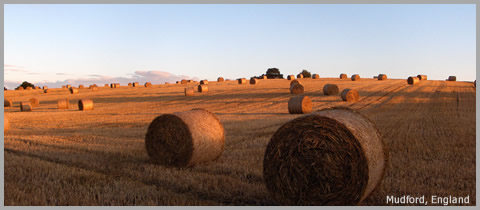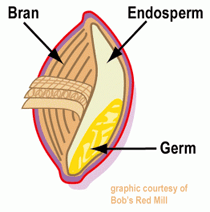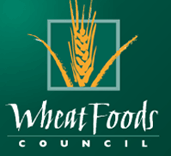
 |
Health Benefits of Whole Grains - Nutrient Comparison between Whole Grains and Refined Flour Products
by Ralph Teller |
|
Whole Grains are the foundation of a healthy diet that help build a vigorous and long life. Eating Whole Grains daily should be part of everyone's lifestyle. Eating Whole Grains are especially important for active people, athletes and expectant and breast feeding mothers.
What are Whole Grains?
Whole Grains include Wheat, Oats, Rice, Spelt, Corn, Rye, barley, quinoa, and sorghum. Here is a complete list of Whole Grains:
|
• Quinoa
|
Whole Grains are the whole seed of a grain as they are in their natural state growing in the fields. The seed is made up of three components called Bran, Germ and Endosperm.
 The Bran is the outer skin of the seed that protects the Germ and Endosperm from pest and the elements. The Bran contains important B Vitamins, Antioxidants and Fiber.
The Bran is the outer skin of the seed that protects the Germ and Endosperm from pest and the elements. The Bran contains important B Vitamins, Antioxidants and Fiber.
The Germ is the embryo of the seed that when fertilized with pollen will produce a new plant. The Germ contains several B Vitamin, protein, fats and minerals.
The Endosperm is the food supply for the Germ that provides the essential energy to the young plant to establish roots for nutrients and water and to grow into sprouts. The Endosperm contains starchy carbohydrates, proteins and small amounts of vitamins and minerals.
Whole Grains are More Nutritious than Refined Flours.
Only Whole Grains contain all three parts of the seed. The grain refining process removes the Germ and the Bran. The refining process causes 25% of the Protein and at least 17 key nutrients to be lost.The loss of nutrients in the refining process is significant. As the below table shows, and by way of example using Wheat, the refined wheat has less than 75% of Vitamin E, Vitamin B-6, Magnesium, Fiber, Zinc and Potassium than does Whole Wheat. Refined wheat has about half of the Folate content of Whole wheat and only 75% if the Protein.
Specific Health Benefits of Whole Grain
Whole Package of Nutrients. Whole Grains contain antioxidants, lignans, phenolic acids, phytoestrogens, and other phytochemicals may help reduce the risk of heart disease, cancer, and diabetes. Like fruits and vegetables, it’s the whole package of nutrients of Whole Grains that are a source of significant health and energy.
Better Intestinal Health. The general consensus is that bran or fiber of Whole Grains are excellent for the digestive and intestinal system and are beneficial for preventing constipation and help prevent diverticulitis which are pockets that form in the large intestines. Men who consumed an average of 32 grams of fiber a day were 42 percent less likely to report symptoms of diverticular disease than the men who averaged 13 grams a day.
Lower Cholesterol. Oats have been found to be effective in lowering blood total and LDL-cholesterol when consumed on a regular basis. It’s good to note that oatmeal, whether it is made from old fashioned, quick, instant, or steel cut oats, are all Whole Grain foods.
Lowers Obesity, Diabetes, High Blood Pressure Risks. “Years ago, scientists hypothesized that the higher rates of chronic diseases we have in the West, including heart disease, are due, in part, to a diet full of processed foods," Philip Mellen of Wake Forest University Health Sciences said. "Subsequent studies have born that out - especially with whole grains. Greater whole grain intake is associated with less obesity, diabetes, high blood pressure, and high cholesterol - major factors that increase the risk for heart disease and stroke. See How to Naturally Help Prevent/Treat Type 2 Diabetes.
Whole Grain Products Label and Mark
 We all have an incredibly wide range of food products to choose from when we shop. As Whole Grains are healthier than refined grain products and are packed with nutrients. Look for products that have the 'Whole Grain' Stamp to insure you are purchasing Whole Grain products.
We all have an incredibly wide range of food products to choose from when we shop. As Whole Grains are healthier than refined grain products and are packed with nutrients. Look for products that have the 'Whole Grain' Stamp to insure you are purchasing Whole Grain products.
What are Good Whole Grain Resources?
The Whole Grains Council is a nonprofit consumer advocacy group working to increase consumption of whole grains for better health. The Whole Grains Council is an excellent resource to learn more about Whole Grains. The Wheat Foods Counsel is a national nonprofit organization formed to help increase awareness of dietary grains as an essential component to a healthy diet. The Council provides recommendations and recipes using grains.
More about Ralph Teller. See Ralph's 1Vigor Log Calendar.
<-- back to top






